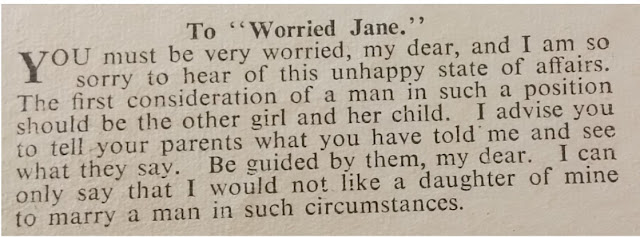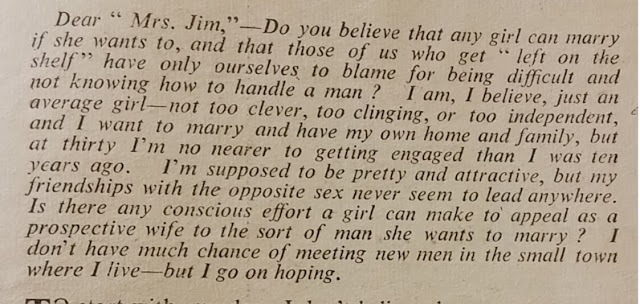Problem Pages of the mid 20th Century
Worried Words
I have been collecting vintage women’s magazines for some time now. They are an excellent historical resource, very helpful in my research around the history of sewing. The best thing is, they can be picked up on ebay for less than the price of a modern magazine – and I often find that there are more articles worth reading in the old ones! As well as the nostalgia and reminders of domestic history, there is always something that makes me laugh. It might be the corny romance story, the endless adverts for laxatives (which says a lot about the British diet of yore) or the health article that doesn’t actually refer by name to the condition it is talking about. There are all kinds of quack remedies discussed and advertised for that regular female affliction that can never be mentioned! The language used to get around this taboo is fascinating. But best of all – the page that I always turn to first – is the problem page. What a feast of entertainment this can be.
Living in the 21st Century with all of the informality and oversharing that we have become accustomed to, it is easy to forget just how uptight the British character used to be. It is clear from many of the problem page letters sent into magazines between the 1930s and 1950s that people used to really worry about etiquette. I think particularly among the middle classes, there was a sense that if they did or said the wrong thing at the wrong moment, then they would never live it down. It’s sobering to realise that people did live in fear of being looked down on so much. One woman who wrote into a problem page in the late 1950s was beside herself with worry about meeting her daughter’s future in-laws in case she used the wrong words during the formal introduction. A “how do you do” instead of a “pleased to meet you” at the wrong time seemed to mean the end of everything to her. Meanwhile, this lady worried about when the use of a first name was called for:
In 1951, a girl wrote into a problem page enquiring about the etiquette of repairing one’s make-up in public. The Agony Aunt wholeheartedly disapproved and told the young woman to stop it at once. I wonder what she would say about the young woman who once plonked herself down in the seat next to me on a train and began to paint her nails?
These were different times morally as well as socially. Inevitably, because of a society that was easily morally outraged, young women had many questions that they daren’t ask their mothers or even their friends lest they got themselves a “reputation”. The magazines were of course limited in what they could print if they were to avoid being charged with obscenity. Sometimes, just an answer is printed (often with the offer of an informative leaflet to be posted out), leaving the reader drawing their own conclusions about what the original problem was.
I have seen more than one letter from young women who tackle the issue of being kissed goodnight after a date.
“I have always thought of a kiss as something serious and sacred.” (1939)
The writer much preferred to shake hands with her prospective boyfriends and she wanted to know if this was an acceptable alternative (in case you’re curious, yes that was perfectly acceptable behaviour).
Another common question is should one go on holiday with one’s fiancé – the answer being not without a chaperone in case the temptations got too much. In 1957, things were loosening up a little perhaps – though it was a few years before the “swinging sixties” would arrive. But one magazine did publish a letter from a girl stating that she and her boyfriend were having terrible trouble controlling their urges before marriage – what should they do? The Agony Aunt advised not spending too much time alone and to avoid activities that would put a strain on their self control. On the whole, she thought it best that they marry as soon as possible. A leaflet went in the post.
I have magazines dating from the 1920s to the 1970s – a time of great social change and progress for women. It is clear that for much of this time young women were almost seen as possessions by their parents, who interfered endlessly in their lives until they were married. Mothers wrote in to ask should they “let their daughter marry” a certain man, even if said daughter was in her mid-20s. Courses and careers (well, a job until you married) were only allowed on parental approval. When the girls finally escaped their parental prison, they found themselves in marriages that they were unprepared for – or that deeply disappointed them. There are myriad letters about “unmanageable husbands” – those who were unfaithful, those who were utterly boring and those that were controlling. The theme of most of the Agony Aunts replies is sadly that it is the wife’s role to be stoic and use her feminine wiles to sort him out – leaving the marital home was not an option. Not bothering to get married in the first place wasn’t much of an option either. Those writing in for careers advice often got short shrift. Agony Aunts agreed that there was nothing as fulfilling as marriage and children.
In the 1950s, there is a noticeable rise in letters from girls that couldn’t get a boyfriend and didn’t know what to do about it. This can’t be a knock-on effect of World War Two at this stage as the correspondents are too young to have been involved. I wonder if it is a result of the subliminal drive that was taking place at that time to get women away from the workplace and contribute to producing a much-needed next generation. Films, magazines and newspapers emphasised the bliss of marriage and domesticity in the 1950s. Girls succumbed to the message that being a wife and mother would be the pinnacle of their life.
It was certainly a minefield to be a young woman in the 20th century. I was born in the 1970s and it is interesting to consider how much of this psychological baggage was passed onto me as I grew up. I thought that my formative years in the 1980s were liberated – but comparing it with my daughters’ generation I’m not so sure. Many girls in my year who were deemed to be of middling intelligence were forced to take typing lessons while the boys were sent to woodwork or metalwork. If anyone had asked to swap e.g. if a boy wanted to type or a girl wanted to make a cabinet they would have been laughed out of the school. This wouldn’t happen today. I think there was still an expectation that we would all get married and have families. I’m glad that my 21st century girls have had more choice and are better informed about the opportunities available to them. I wouldn't have wanted to be a woman in the 1950s for anything!






Comments
Post a Comment